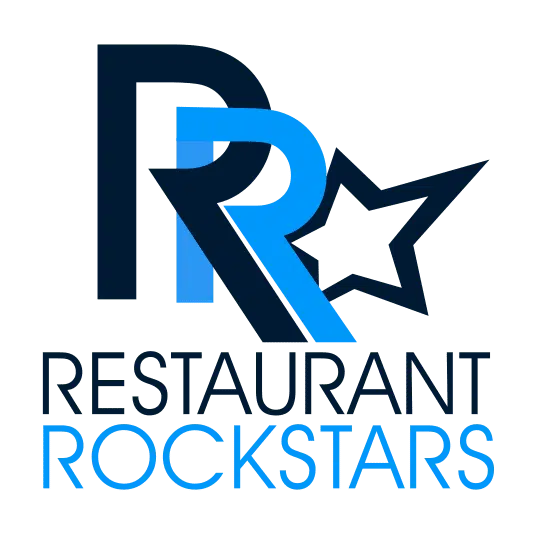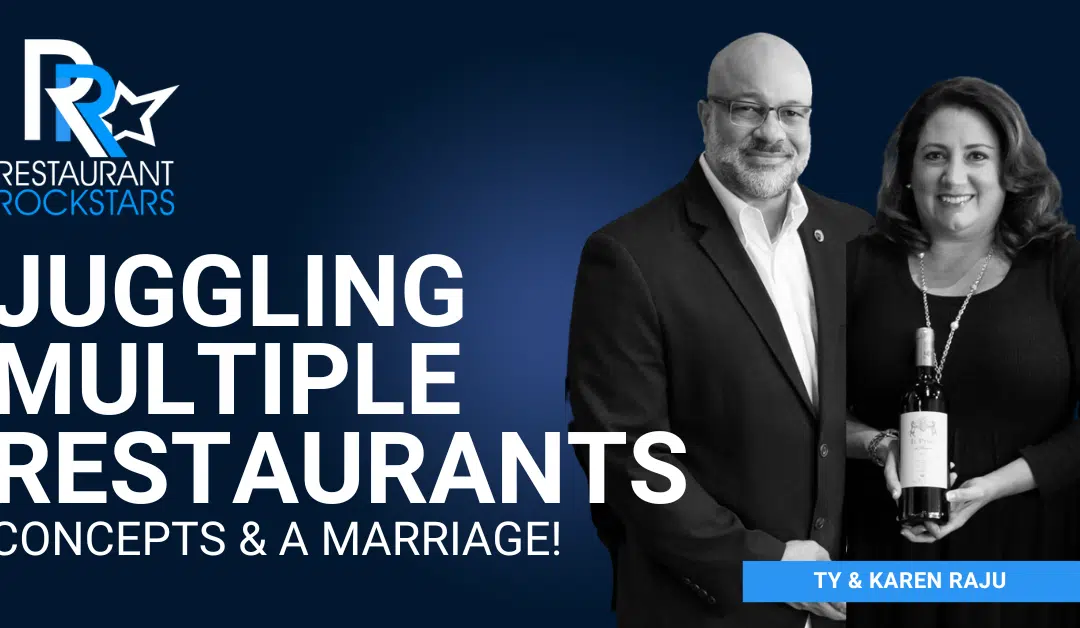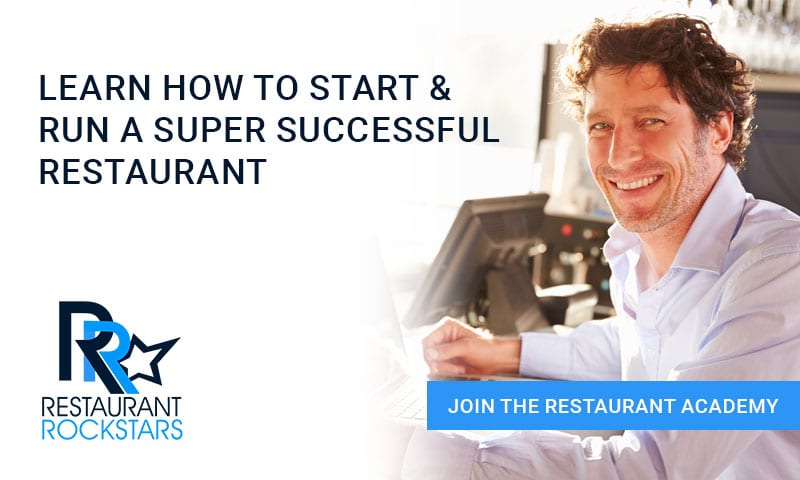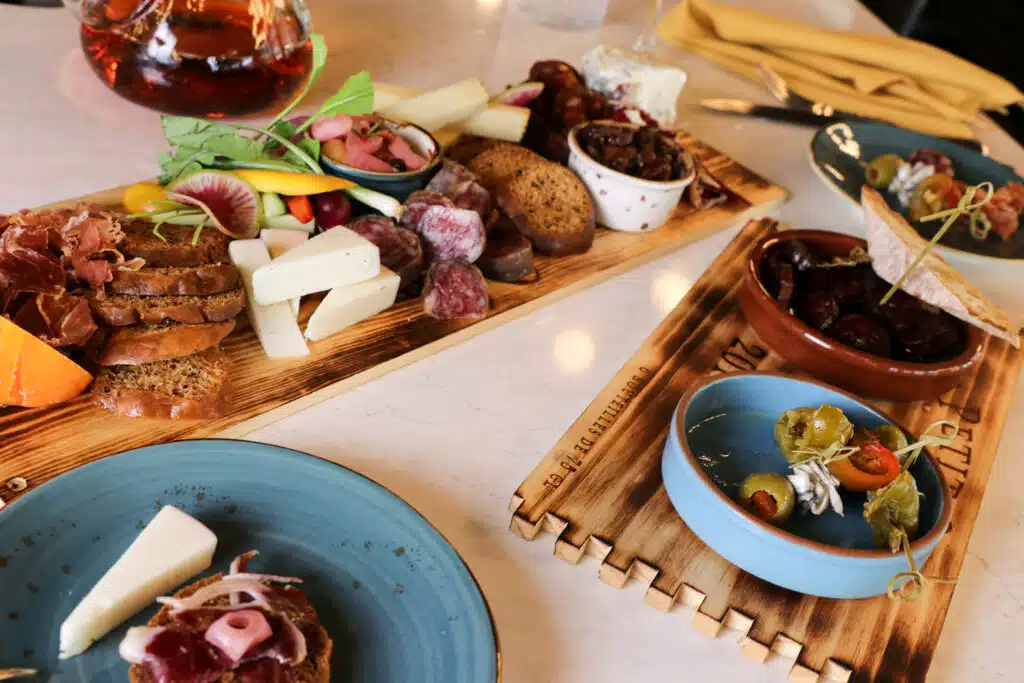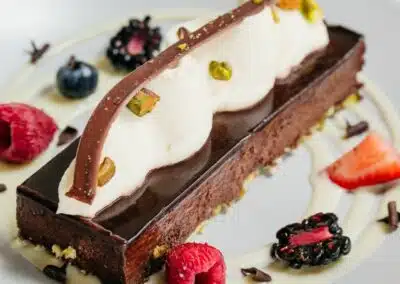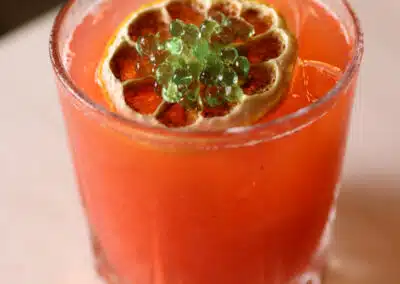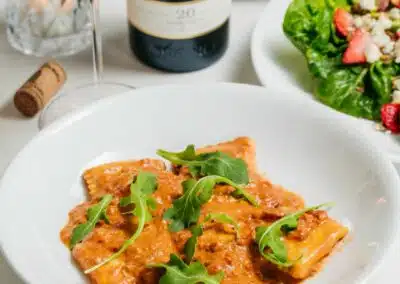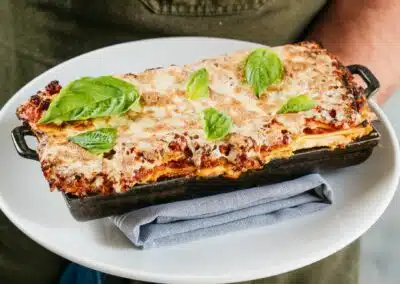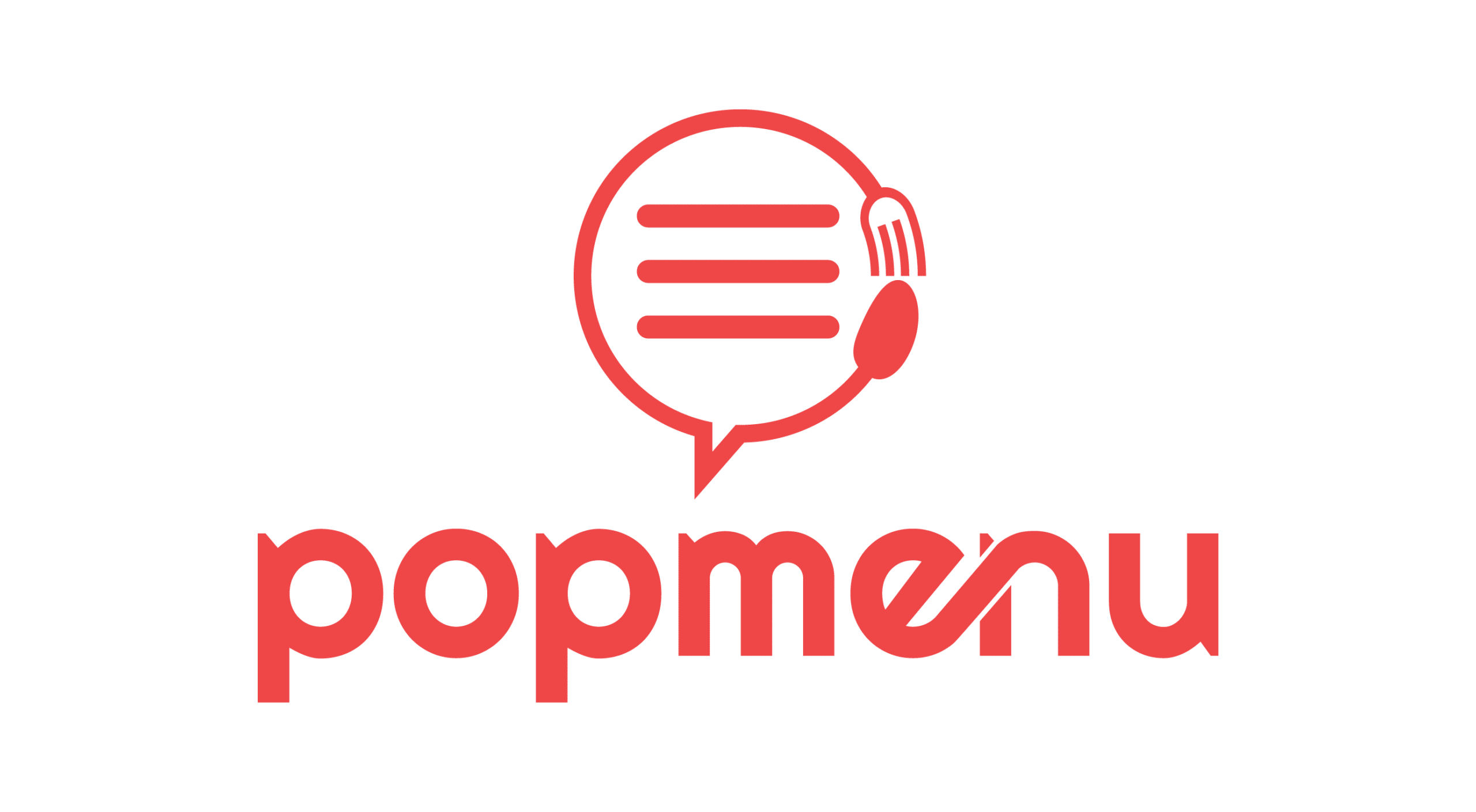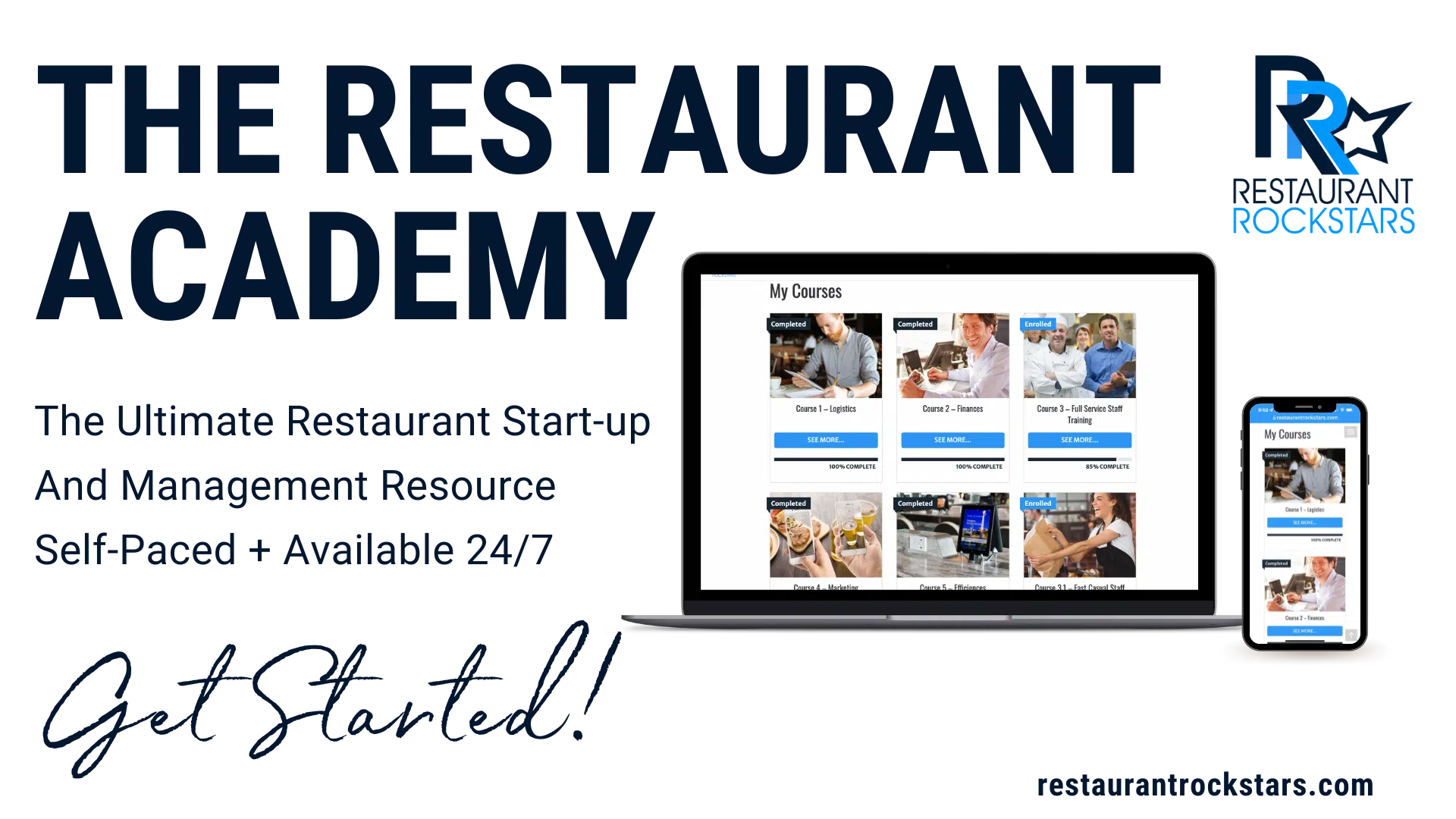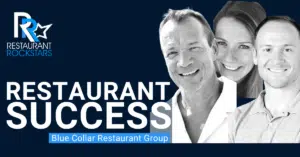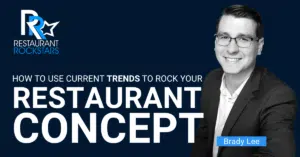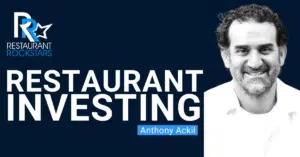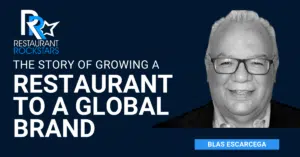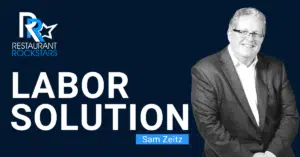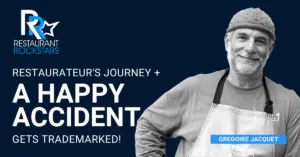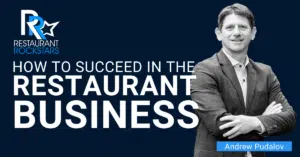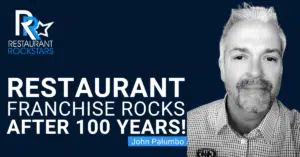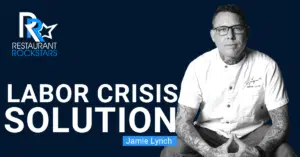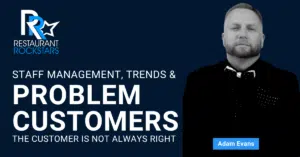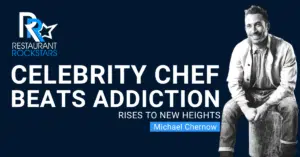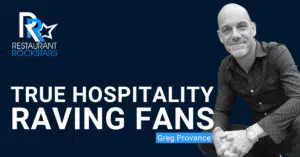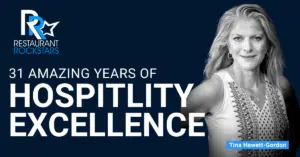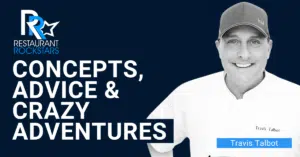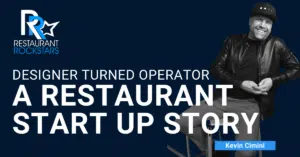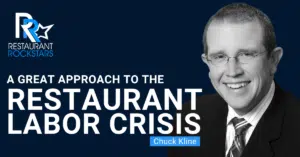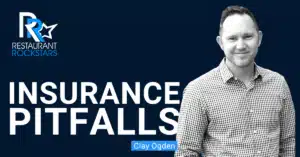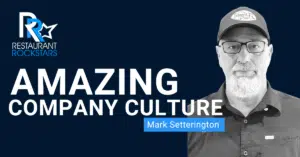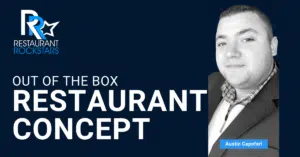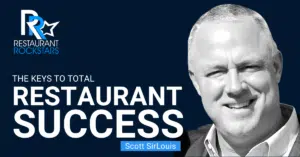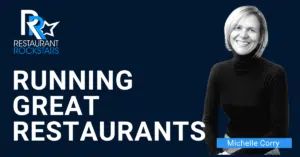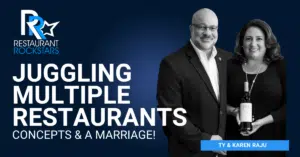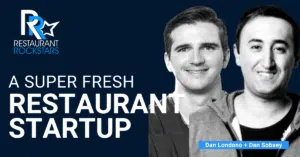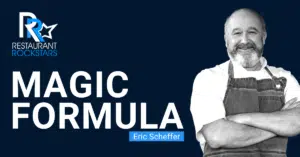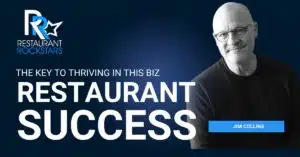Restaurant Rockstars Episode 369
Juggling Multiple Restaurants And Concepts
LISTEN HERE OR ON YOUR FAVORITE PODCAST PLAYER
It’s hard enough running one restaurant, but how about multiple concepts and multiple cuisines?
How about juggling a demanding day job and then working the restaurants with your spouse at night? Could you stay in your lane and find that delicate work/ life balance?
In this episode of the Restaurant Rockstars Podcast, I’m speaking with Ty & Karen Raju, co-owners, and founders of Bene Hospitality Group. They are juggling multiple restaurants and concepts including Italian, Spanish and even New York style pizza!
Listen as this couple shares:
- How Ty balances an IBM career with founding three unique and very different restaurant concepts, becoming a certified sommelier and winning two Wine Spectator Awards of Excellence.
- Husband and wife roles that create restaurant success.
- How leadership creates accountability and team performance
- The importance of smart financial controls, buying economics and constantly keeping an eye to the bottom-line
- Their brand-building, cross-promotion, and guest loyalty strategy
- The benefits of starting a wine club that introduces guests to the wonders of all things wine.
- Finding time for community involvement and giving back
And my favorite; the couple’s “4 C’s” – how communication, collaboration and contribution equal a strong culture.
Don’t miss this episode, then go out there and Rock YOUR Restaurant!
Roger
Connect with our guest:
SAVI Cucina + Wine Bar – @savicucina
Sommba Spanish Gastrobar – @sommbacocina
Upcoming concept, Woodhaven – @woodhavenpizza
People go to restaurants for lots of reasons for fun celebration for family for lifestyle. What the customer doesn’t know is the 1000s of details it takes to run a great restaurant. This is a high risk high fail business. It’s hard to find great staff. costs are rising and profits are disappearing. It’s a treacherous road and SMART operators need a professional guide. I’m Roger. I’ve started many highly successful high profit restaurants that I’ve now sold for millions of dollars. I’m passionate about helping other owners and managers not just succeed, but knock it out of the park. I created a game changing system and it’s filled with everything I’ve learned in over 20 years running super profitable, super fun restaurants, everything from creating high profit menu items and cost controls to staff training where your teams serve and sell to marketing hooks, money maximizing tips and efficiencies across your operation. What does this mean to you more money to invest in your restaurant to hire a management team time freedom and peace of mind. You don’t just want to run a restaurant. You want to dominate your competition and create a lasting legacy. Join the academy and I’ll show you how it’s done.
Welcome back to the podcast. Thanks for joining me this week’s guests are husband and wife, restaurateurs that embody the word hospitality but more importantly, they show us how to reach a balance in our life. You know it’s really hard when you’re a restaurant owner operator or General Manager to find a balance not be tied to your business. And they talk all about how they stay in their lane and actually one of the founders of this restaurant group Ty is also a full time career person at IBM on top of being a sommelier and being named to Wine Spectator lists in multiple restaurants have his and Karen boy hospitality background going way back to the beginning and the two will talk to us about staying in their lane. There’s so much in this episode, so you’re gonna want to stay tuned. Now on with the episode.
You’re tuned in to the restaurant rockstars podcast powerful ideas to rock your restaurant. Here’s your host Roger Beaudoin.
Rock Stars The busiest time of the year is coming. Is your staff ready for the holiday rush? Well this year give your team the gift of pop menu AI answering a simple solution for phones ringing off the hook. Ai answering handles calls 24/7 365 days a year so your staff can focus on in Person guests. Customize your greetings and responses, answer common questions, promote specials and events and send follow up links to ordering and reservations. Ai answering handles at all while escalating more complex conversations back to your team. Now never miss another tasty revenue opportunity. Pop menu is the marketing technology platform designed to make growing your restaurant easy. Discover more AI restaurant tools that turn your to do list into an already done list. Request a demo today and my listeners for a limited time will get $100 off their first month plus lock in one unchanging monthly rate. Go now to popmenu.com/rockstars again, get $100 off your first month at popmenu.com/rockstars.
Welcome back, everyone. This is the restaurant rockstars podcast. Welcome to the show Ty and Karen, how are you today?
Doing well doing great. Thanks for having us.
Great to have you here. Again, a really dynamic Restaurant Group really interesting story. We’re gonna get into all of that. But first, tell me about your hospitality backgrounds.
Oh, gosh, I can I can go first if you want. So I grew up in a an Italian household who we all love to eat. So in order to eat, you got to know how to cook. Right. So we I think I was given my first cookbook at the age of seven and just fell in love with being in the kitchen and always love to make people happy with food that was just kind of ingrained in my DNA. So through the years, I tried to figure out what I want to do with my life, went to school for hospitality and went to Virginia Tech graduated, but then left the industry to kind of have a normal nine to five lifestyle. So did that for several, several Gosh, about 20 years and then decided you know what? I think the one thing that that brings me home is the passion of making people through making people happy through food, wine and hospitality. So it was kind of a natural fit to come back home to this industry for sure.
Oh, I can certainly relate to it. So when you were in school at Virginia Tech, were you on the culinary side, were you on the sort of hospitality management side? Did you do a little bit of both? How’d that work out?
Yeah, did a little bit of both, which is really great about their program let you dip your toe in the water to figure out kind of where you want to steer your career within the hospitality industry. So you know I remember vividly working in our fine dining restaurant on campus and we all had to do a stint first semester and learning all of the stations learning every piece of, of the restaurant and being like, wow, this is a cool space to be.
That’s great. Terrific. Thanks for sharing. How about you, Ty? What’s your story?
Yeah, you know, I think like Karen, you know, hospitality has always been a big part of my life, you know, the family. Im a kid born in Queens, New York, always grew up around very diverse and ethnic foods, you know, from Spanish, to Italian to Chinese to Greek. So it’s always been a big, big part of my, you know, my youth growing up. And then, you know, trying to get through college and learn how to, you know, be an accountant, be a financial analyst, worked in a number of restaurants. And, you know, the bug just just bit me a long time ago. And it’s just been with me ever since.
Certainly a business of passion. Now, what’s really interesting is you still have a day gig with IBM, is that correct?
Yeah, yeah, I’m a partner in our global practice.
So what really intrigues our listeners and myself is how you manage to balance starting a dynamic Restaurant Group, and having, you know, a very intense challenging job, I would guess, at IBM and continuing to hold together a marriage and working together with your wife, Karen, and work in the restaurant, which is obviously a stressful enterprise. And how do you keep it all together? How does that work for you?
Yeah, im gonna let you answer, but I’m gonna make a joke real quick, because you’re used to be completely dark before we started. So you can you can see how that’s going.
Well I worked with, well, I’ve worked with my wife, and you know, I continue to work with her and restaurant rockstars that, but that’s not why my hair is gray. I’m just naturally aging, but thank you for sharing. So go ahead. Ty, tell us how you balance.
Yeah, no, Karen brings a good point, my, my older brother did say to me that of all all of us brothers, I have the grayest beard, and I am the youngest. There is something to that, I think. But Karen saying it’s, we all have choices in life in terms of how we like to spend our time what we’d like to do. And for me, you know, working, you know, my day gig, very intense, you know, very dedicated profession of, you know, IT sales and consulting. But the restaurant business to me is sort of, you know, my passion, right? It’s a passion project. And so in terms of, you know, how do you balance, it’s not easy, but we do have just some amazing leaders within our organization. And we have some great, you know, investors and friends who also, you know, are very much part of the hospitality family. And so that makes it, you know, achievable. But of course, you know, it does come with its challenges, I think, you know, if we’re being completely honest, you know, we’ve given up some personal, you know, time and, and commitments to, you know, to chase our dream, which, you know, is worth every bit of it.
Wow, you know, it’s a similar story. I started restaurants 30 years ago, and I had a full time job. At a major ski resort in marketing. I was a marketing director for major ski resort saw an opportunity in the town where the ski resort is located, something struck me and it was Italian, because I spent, I was able to live in Italy when I was in graduate school for a whole summer. And I was so influenced by woodfired pizza on every corner. And I know you guys are starting a pizzeria. But suddenly, I moved to this small town, and there’s an opportunity, and I’ve got this full time job. And I’m thinking of starting a restaurant and somehow was able to pull that together. And then obviously, after a year or two of working, you know, six days a week at the resort and going over the restaurant every single night, I was finally able to make the jump and just did it full time. And so I totally get it. You know, we have something in common here. So tell us about your Hospitality Group and tell us the brainchild for it and the story in the timeline and take us back as far back as it goes. When you got the idea What was the inspiration? What it was like to start it and where it is now compared to you know what your original vision was? That’s a lot to unpack. But take us there.
Yeah, yeah. Well, I’ll get us started here. But if you look over my my shoulder you’ll see a picture of both Karen and this wasn’t even seen. But the picture of Karen I sitting on down mountain and so every year before we started to get into the the venture of running Benny Hospitality Group and opening SAVI Cucina wine bar, we just go to one country every year, sometimes twice a year, to go enjoy some of the things that we we really enjoy, which is number one, why but to just traveling and being away and having time together. And so we were sitting on the side of down mountain enjoying a bottle of soul of wine, and one of our favorite wines. And as we were sitting there thinking about, you know, kind of, you know, our journey through life, how we come together, what we really enjoy. We had just moved to Mount Pleasant, South Carolina, you know, a sort of a budding growing kind of, you know, community that was lacking. maybe some more diversity and ethnic foods, which has come a long way now, I think our communities is not star for ethnic cuisine as much as it maybe was at the beginning. But we just decided that, you know, this was an opportunity for us to do something we really enjoy and love. And it was never about the money, it was never about, you know, becoming/ growing this big, you know, giant Restaurant Group or anything like that it was really just about connecting to our DNA, which is hospitality, and people. And they’re on top of that wine, which is, you know, my passion. And, and we decided to really start getting serious about planning and potentially finding a spot, we spent about a year looking for a spot, nothing really, you know, sort of triggered our, you know, our, our emotion or our selection process to say, this is the one. And then sure enough, you know, the space, where SAVI is today became available. And we said, hey, this is this is it, and we decided to jump in headfirst.
Timing is everything, isn’t it?
Always, and it’s funny, you know, when I think about the SAVI space, we were initially looking for, you know, like 2020 500 square feet, but I feel like the universe always gives you what you can handle. So the universe delivered 5000 square feet to us. So we were like, Okay, here we go. But it has proved to be an amazing spot, you know, we opened just prior to COVID. So we opened in November of 2019, hit our stride, and we’re doing great, and then all the sudden, you know, COVID hits. So we had to get very innovative very, very fast, and pushed us into areas that were potentially out of our comfort zone and forced us to make business decisions to keep the ship afloat. So, you know, we were very lucky about, you know, with our location, you know, Italian food translates very well to take out delivery. We also have a very large outdoor patio that gave us flexibility to serve guests in an outdoor setting. So, you know, through all of that there were a ton of silver linings that that really helped us get through.
Wow, isn’t it amazing?
Timing is everything
Yeah, it’s timing. And it’s also fate sometimes too. You know, had you found that 2,025 square foot space life would have been entirely different. So wow, what challenges that must have been and how resilient this industry is for our listeners that obviously are still running restaurants and involved in this industry because it devastated everything that we knew prior. And interestingly, just like yourselves, I was out of the business for many years, and then had the brilliant idea of buying another restaurant just before the pandemic. So I went through everything you went through. And we, I hate the word pivot now, because it’s been so overused. But that literally happened five or six times just to make the place survive. And you know, just totally transition from this idea to this idea to this idea and adopt the new technologies and make everything work. And so I know our audience can relate to what you’re saying. Tell us about, what’s the secret of your success? I mean, it’s you mentioned the word hospitality. You mentioned the word leadership. And I’ll dive into both of those. But what is really the magic formula for Benny hospitality in your current success right now?
I think I’ve got a couple ideas. And you can you can follow up on this. I think A, number one, you have to have passion. Number two, you can’t just say, Oh, hey, I love to cook, or I love to be hospitable. And think that you know, a business plan is going to fall into place around that. So you have to be very methodical and maniacal about what your business plan is and stick to that. But also know that you are going to have to pivot right. In overcome challenges along the way. I think the other piece of it is surrounding yourself with a strong team, surrounding yourself with people that may not be great in the areas that that you are. But I will come back to the biggest thing to me is passion. You have to have passion for this business or, or else you’re going to be come very tired very fast.
That’s an excellent answer. Ty, do you want to add anything to that?
Yeah, gosh there’s so many so many little things that really support what Karen said. But you know, I think it comes back to you have to have grit. You got to have passion and you can’t be afraid to try something new. You got to continuously experiment, explore, and find ways to give people what they want. And in a business like ours, it’s hard to always do that and be profitable. Right. But it’s getting, you know, it’s getting inventive, it’s getting creative, it’s using technology. But at the end of the day, it’s finding what do people want? And what are some creative ways that we can give them what they want and still, you know, run our very profitable business.
You know, that’s a really interesting point you make about experiments, because they happen all the time. And you need a certain amount of risk tolerance depending on how risky the idea is, that could be a huge payoff and return on investment. Or it may seem like a great idea, either in theory on paper, and then you try it, and it could end up costing you quite a bit of money and setting you back. And everyone is different in terms of the risk tolerance. But when you’re in this business, you’ve got to be resourceful, and creative. And do you guys find yourselves not very risk averse? And you’re more willing to take chances? And after you answer that, I’m going to ask you about anything that you experimented with that you thought was a great idea that maybe didn’t work out for our audience’s benefit?
Well, let’s Ty, answer the risk question.
You know, I think by nature, I’m a very much a risk taker, and a very methodical, very well thought out, you know, very calculated risk taker, because I always feel that if you’re not taking risks, you know, maybe the most risky thing to do is to do the status quo, right? Because there’s plenty of organizations, plenty of folks who can just keep doing what we’ve always done. And you know, and be successful at it. And if you really want to be successful in a different fashion, you have to, you have to take risks. And again, it’s not at risk of, hey, let’s go open this up in the middle of the desert like they did in Vegas.
Sure and look at what it turned out. But the original people with that idea didn’t work out so well for but ultimatley look what happened, but go ahead. Yeah.
yeah, yeah, but you know it, but I think it’s, you know, it’s just experimenting with small experiments, and you experiment to learn. And even if you don’t succeed, you know, the ability to take away, you know, some learnings from it, and may be incorporated into a new idea that comes along in the future, you know, makes that initial experiment very much well worth it. In terms of, you know, maybe where we’ve experimented and haven’t been successful. Nothing obviously jumps to mind, although I’m sure there’s a million different things. This jetlag from Sydney is probably not helping my brain.
Thats right. You just jetted in from a very long trip. You’re doing remarkably well. I’d be sleeping.
Espresso. but I will, I will say, you know, we now here’s here’s a case where we had a very successful experiment, and maybe not as successful trying to replicate it. And that is our, our wine club. Right. So one of the things I’ve always you know, we talked about every year, we would go to a different place, mostly Napa, Paso Robles became two of our favorite places, pasa was actually probably our favorite place to go to in terms of wine country, and because it just has a very hospitable, very, you know, non pretentious way about it. So, when we opened SAVI one of the things I always wanted in a wine club was something that felt like, Hey, I’m in control of what wine I get, there’s too many times you join a wine club, or you’re in the wine program, and they tell you every month the two or four, six bottles that you’re getting, which is cool, and I completely understand why they do. But I always wanted to let folks try everything, and then let them pick which two or four six bottles they wanted. Now, you got to be incredibly accurate in you know, your data and have a good understanding of, you know, are we going to be able to make this happen and you know, how many bottles are we going to need? So, you know, again, back to technology use a lot of data and analytics to figure out you know, what are the trends are is really important. So, you know, we were very successful at that at SAVI, we had about 500 members, we never planned on getting really that big right for a restaurant. But you know, it was very successful. We opened our second venture which is a Spanish gastro bar, and we brought that concept there. And what we found is that people you know, aren’t as interested in the wine club at at Sommba as they are at SAVI and and so now we’ve had to kind of pivot and think to ourselves, okay, maybe there’s a better another way another experiment we can do to really make it you know, much more in line with the Sommba concept versus you know, the SAVI concept.
so that’s a very Wow, there’s so much to talk about here. So you’re a sommelier and obviously your own a file before you got really in depth. I mean, you mentioned that you know, that piece of art behind you. Did you are you self taught did you go to school for this? Did you learn to be a sommelier or did you just just really dive into wind and rain wide spectacular and try obviously lots of different wines, and then I know what I like it, but then you branched out. I mean, I don’t want to speak for you tell us the whole story.
It’s a good question. Well, I’ll tell you where the bug first hit me. So, as we talked about earlier, you know, when I was a young lad going through college, working my way through college, you know, I worked at a four or five star resort called Turnberry Aisle. And we had, you know, sommeliers there, you know, a lot of great wine and amazing cellar. And the sommelier was working one night, Kenny Rogers came in, ordered a couple of bottles, of Mer Soleil. For him, it is his team, it was after a concert that they had down in South Florida. And, and, you know, as he always was, he was a very generous person who ordered some extra bottles, knowing that they weren’t going to use it and finish them or drink them, and gave them to the staff. I mean, just an incredible human. As nice as the guy is, I think I’ve ever met in from a celebrity perspective. And at Turnberry, I met, you know, quite a quite a few. And I had a glass of water. So that night, it wasn’t a wine drink at the time, it was, you know, just turned 22 years old, who just came back from the military. And, and it the bug just bit me. And at that point, I wanted to learn everything I could about wine, because I, I couldn’t get the feeling or the memory or that, you know, sort of that experience out of my brain. And so I was constantly pestering and asking questions of the sommeliers and stuff. And for the next 20 years, you know, in the business world, I spent a lot of my time looking at wine lists, entertaining, and just always wanting to learn about wine, and what made that juice so spectacular, or, you know, in some cases, you know, very, very mediocre. And I wanted to understand what the drivers were behind that. So I have a, you know, with my personalities when im always wanting to learn, always looking at data observing. And so ye became my, my kind of playground to feed that, that that itch.
So when you’re in that position, and you have that extensive knowledge, you obviously need to know wines around the world. But you’ve mentioned numerous trips, to either Napa or Paso Robles, and that sort of thing. And Karen, you’ve got Italian roots, have you ever been to Tuscany and toured the vinnage, the different, you know, vintners there and that sort of thing?
Yeah I’ll tell you it’s very funny, because had you, I have been to Italy, and kind of did the, the standard tour of Italy to hit all of the places that you’re supposed to hit, right. But I want to go back and spend more time in the areas that I that I truly fell in love with and and captured my heart, which Tuscany would certainly be one of them, obviously. And if you would have said to me, you know, what, six or seven years ago, what kind of wine do you love to drink, I would have told you you know, big bold cap from from, you know, California or from Paso or in my palate has expanded significantly to fall in love with so many Italian wines. And that the cool thing about Italian wines is for me, they’re very value based too. So you don’t have to spend a ton of money to get a great bottle of wine. And you know, yeah, and I think so many people, including myself, at one point were very intimidated by Italian wines a you know, sometimes when you read the label, you’re like, is that the grape? Is that the vineyard is that the What is this? What am I drinking. But I think once you kind of get over that and feel more comfortable with Italian wines, my God, there’s so much to explore. And, obviously, everything well, they pair really well with food because we’re Italian. So
you know, I remember I mean so much about my wine experience in Italy wasn’t about ordering bottles of wine is about getting the liter bottles of the house wine or whatever the local winery was down the road. And they were excellent wines, they were great values. And it was all part of the experience of, you know, sharing a liter with someone you’re with or even, you know, strangers, a family’s tiled table, but that was all part of the culture. And it was really incredible. And that’s so much different here than in America where you would order a bottle of wine in the house wine is not necessarily a great, it’s a value, but it’s not necessarily a great glass or, you know, where it comes from that sort of thing. So, you know, European cultural differences, obviously, being what they are, but, and now you’ve got a Spanish concept as well. And you’re saying that the wine club isn’t quite what it was at SAVY. Is that because it’s heavily, you know, tilted towards Spanish wines temper Neos, that sort of thing, or is that a fairly diverse list where you’re just wondering why and we we’ve got plenty of choices here, but people aren’t picking up on it. What do you think’s going on there?
Yeah I think it’s more of a vibe than anything, right? It’s, you know, SAVI, is much more elegant, yet casual. We have full time sommeliers, it just lends itself I think, to more of that tasting and, and sort of the the journey of tasting different wines, whereas Sommba is a little bit more like I said, Gastro bar, like and so, you know, it’s one of those cases where I think it’s more of an American thing, right, because if you took Sommba and put it in Barcelona, people would beat down the doors to come and try wine there, as well as have cocktails, and you know, then obviously, our culinary is off the charts there. But, you know, it doesn’t feel like a place you’d want to maybe, you know, drink some great wines all the time, right. So it’s really more of a, you know, for those that have been to Europe, and you know, we actually get a lot of comments of like, Oh, my God, you know, I’ve been to Barcelona, this is like, I’m back in Spain. And so it’s, I think it’s a little bit more of that than anything, it might be kind of like the area where we’re at, it’s a bit more, you know, every day, very casual than it is, you know, big city, which is the charm and what we love about this area, so it just may take a little time to kind of, you know, to get that off the ground. So we’re not going to, we’re certainly not going to stop doing our wine club, because, you know, we we do another wine club a mile down the street, so it doesn’t cost us anything, right. But what we want to do is just make sure the experiences is really within the lines of what we’re trying to achieve. To your question, though, about Spain. And you know, we do a lot of Spanish wines, Argentinian wines, Chilean wines, but domestics as well. And we’ll do some Italians, in there also. But I do think that, you know, it’s more of the space that it is probably, you know, the wines per se.
well, I’m really glad you brought it up, because I love to emphasize to the audience, the importance or the power, from a marketing standpoint that a club has. And obviously, we’ve all been in sports bars, or those bars that have mug clubs, and I had a mug club for many, many years that grew huge in my largest restaurant. And then suddenly, the lady said, Well, what about us? It’s like, what about a wine club, you know. So that became a huge opportunity for that, because Sure, lots of ladies drink beer too. But though, you know, certain great customers asked for a wine club, and then the wine club grew. And we had really beautiful glassware and the pores were larger, and there was certainly value added. But one of the things that we noticed was if customers used to come in maybe twice a month, or three times a month, maybe now they were coming in several times a week, because they felt this sort of loyalty or affinity or exclusivity because they belong to this club. And then they had their friends recommend to join and the thing sold itself. So it’s a huge opportunity. And I definitely think it’s got legs for all of your concepts. And it’s just a hook. You know, I love hooks, you can have too many hooks in this business. So I’m really glad you brought up the wine club. Let’s talk about the different concepts do you cross promote them from a marketing standpoint? Do you want your guests to get to experience all your different concepts? And then whether they develop a favorite or they kind of rotate through and that sort of thing? How do you that? Is that part of your strategy?
Yeah, no, absolutely. You know, to me just talking about SAVI and Sommba and their similarities and differences. You know, we basically SAVI is our you know, our seasonal menu changes and we have, you know, for Wine Spectator awards, and, you know, we been recognized for, you know, probably one of the top service restaurants, you know, in the area, which and Charleston is very much a splittable very high end restaurant, you know, foodie kind of town. So for us to kind of achieve those awards in this town says a lot about you know, our team and staff and, and really what they believe hospitality is, and then you have Sommba, which again, more gastrobar More fun, energetic. You know, it’s okay to laugh really loud and have a great, great time. And maybe we do some poor on shots. You know, how to add the canter where you know, you just pour it straight in your mouth. Or you could use the glass whatever people prefer. And then you get you know, our Woodhaven pizza concept, which is very near and dear to my heart. I’m a pizza fanatic. As much as I love wine. I probably love pizza almost twice as much.
Now it’s New York style. Did you grew up in New Yorker, and why did you decide the New York style pizza?
Now I’m from Queens, New York.
Oh, there you go. Okay, yeah.
You can always take the kid out of Queens. We can’t take the queens out of the kid is, you know, sort of what I always say. And, you know, I just, you know, New York City style pizzas is different, right? And so many folks, they talk about New York style pizza. And you know, the challenge for me was always like, well, when you talk about New York style pizza, are you talking about Rochester? Are you talking about buffalo? Or are you talking about, you know, upstate New York where they may have a different take on what pizza is like, and there’s no right or wrong answers. But when you think a New York City style, right, it is that it is that thin, crunchy, you know, savory, and you know, just an amazing sauce that, you know, just brings a pie together where you almost don’t even need toppings, but you throw toppings on it after that. And it’s you know, it’s even more amazing. So yeah, kid from Queens from originally born in Sunnyside. Raised in Woodhaven, and, you know, pizza has always been near and dear to my heart. And were trying to re-replicate that here in, in South Carolina, with our partners who are both from Jersey and one of our partners, you know, spent 40 years in the business of pizza with his family. And so, yeah, we’re trying to bring that to this area and let people enjoy that.
So the name really comes from the neighborhood then.
Yeah, yeah, WoodHaven does. So I’ll tell you a little story if it’s okay to share stories on how Woodhaven started. Woodhaven pizza was probably born 50 years ago, but it was born 50 years ago, in my mind, right? It is just now coming to physical form. And, you know, WoodHaven pizza to me is the memory of my mom, taking me now as you can may or may not tell from this podcast, I have a hard time staying on track, right? My, my brain is going a million miles an hour, you know, which is why the restaurant business is perfect for me as well as the consulting and technology but it’s because it’s always changing and I love just you know, observing and changing my pace and, and gears. But my mom used to take me if I was good for that week, in second or third grade, she takes me down to the corner store. We take one of my Hanes white t shirts, right or fruit of the loom or whatever it was probably for loom actually. And for $1 you can get you know, an iron on, you know, sort of, you know, logo, which I get Boston Zeplin AC/DC, right. They just iron it on for a buck.
You a Classic Rock fan too Ty?
Oh, yeah. Oh, yeah, for sure.
Some of my favorite bands you just mentioned.
Yeah. And so after that we’d walk across the street to a pizzeria. It was underneath the train, you know, at the overhead train tracks. Oh, sure. And, yeah, and so, you know, trains and, you know, obviously, we take the trains into the city, you know, from Queens, New York, but on Woodhaven Boulevard we’d walk across, get a slice. And that’s my very first memory of pizza. Right? I’m sure I’ve had it, you know, long before that. But there was something about that one day, where we took that white t shirt. I was good that week, I wasn’t disruptive in class. You know, the iron on my patches of Boston t shirt. I still remember to this day, walked across gotta square grandma pie. And, you know, I was hooked on the pizza bug ever since mentally.
Gotcha. You know, mine was New Haven style pizza, because my aunt, my mother’s sister lived in New Haven. And we went there all the time to visit when I was a kid growing up, and pizza was huge in New Haven. So I remember that being kind of an early influence as a kid. But I saw it. I also had relatives in the Bronx. And I remember staying there and having the overhead trains passing right over. So it’s like I’m reliving your childhood and mine just through your conversation. But yeah, it’s all pizza is a wonderful thing. And obviously, it’s got so many different variations, and all that. And I obviously, you know, built my businesses on woodfired pizzerias, and I was all influenced by, like I said, trips to Italy and living there. But it’s such an amazing food. But it’s such a competitive market segment. Also, do you find that there’s lots of pizza competition in your area or not so much?
Oh, no, absolutely. But I think if you start talking about New York City style pizza, there’s probably not as much competition.
I’m sure that’s true.
Yeah. Yeah. And and as you know, if you’ve been New Haven, you know, talk about competition, right. So probably three of the greatest pizzerias in the world are within a block of each other. Right. So talk about competition, right. But I think our competition isn’t other pizza places, necessarily, I think it’s, you know, getting folks away from maybe some of the chains, right, the folks that don’t treat pizza like a craft. Because there’s, you know, pizza is a very simple product, but it’s not easy. And that’s what gets lost, right? The time you have to take to really, you know, nurture the dough, right? And use the right flour and let it sit for two days
and the quality of the water as well.
It’s very debatable.
Okay, tell us about that. We had excellent water quality, and we made our own dough fresh every day from scratch. So I totally get what you’re talking about. It’s a time honored process. You got to put the craft into it. It’s not just about you know, slapping something together and calling it pizza. You’re absolutely right about that. But keep going. I don’t mean to interrupt you.
No thats okay. It’s funny. You mentioned a warning. I mean, of course, right? I mean 60 to 65 in some cases 70% of the product is water, so the water has to be good. But there’s this old, what I would call myth of, “Hey, you can’t make great New York City style pizza outside of New York City because of the water”. And that’s just not true, right? But you do have to understand that your water needs to be clean, it needs to be flavorful from a mineral perspective. And, and so it has to be that very crisp water. And in New York, it’s great, because you could open up a tap and get that, right. Whereas maybe in South Carolina, or Florida or other places, you can’t just do that. Right, you so so we actually filter all of our water to make sure we get a quality of water, you know, that is similar to what you would expect to get, you know, from the New York City Water Authority. But, and I lost my train of thought, but, but yeah, I do have something to add there, too. This was actually, I think born while you while you’ve been traveling the last couple of months. So we’ve got one of our chefs at SAVI and we do neapolitan style pies at SAVI. And I love to watch him teach some of our new cooks that come in how to properly make a pizza. And with every move of his hands, he says respect the crust, respect that grace, and it gets it this mantra into your head. So I always love to watch him train other folks. Because he’s teaching them about the art of making a pizza, right? It’s not just throwing it all together. Like Ty said it is respecting the product. And in the final, final piece.
Oh, I didn’t remember where I was going with that.
keep on rolling.
It was, you know, when they were talking about the water, I think they didn’t pay the respect to the people who actually cared about the craft. Right? They made it about oh, you can’t do because of the water? No, it’s because you had generations of pizza makers, who understood how to respect the craft, right? How to feed your dough, how to create the right environment and understand the variables that happen, right? It gets hot, it gets cold, it gets humid, it gets dry, right. And sometimes, right humans who are touching these the dough, right? Some days, we have good days, and some days, we have bad days, right. And what made those pizzaiolos so great is that they knew how to separate their personal life from the craft, and the craft almost became more important than anything. And so you know, they were just very in tune with the environment around them. And they actually put a lot of care and time into those pieces. And that’s what made them great. The water is important, but it wasn’t the water, it was the person behind it.
I totally agree with you. And it’s, you know, we mentioned it being such a time honored tradition. But you know, in Italy specifically, it’s such a passed down from generational thing. And it’s an it’s a revered position to be a pizzaiolo. And I’m sure you’ve been to some of these restaurant shows here, especially, I’ll be speaking at the pizza international show in Orlando next month. And they have major competitions, right on the stage, you know, the dough throwing in the, you know, the pizza making, and I’ve eaten a lot of pizza at that show. But you know what I’m saying but it’s, it’s it’s a tradition. But it’s also you know, very much a prestige thing over there in Italy, if you’re a generational member of a family that it’s been passed down, and the recipes and all that and that’s the craft, that’s part of the craft, that’s part of the Passion we’ve been talking about. And it shouldn’t just be about pizza. It’s about every dish that any restaurant makes, it should be about the craft, the quality, the pride and the passion behind it and making sure that every dish, you know, is as perfect as it can be. And you want your guests to absolutely love everything that you make. Thats what business is about doesn’t matter what the concept of the cuisine. But, you know, I’m glad we’re talking about this. Let’s shift gears a little bit. Let’s talk about your individual roles at Benny. And you know how you guys stay in your lane? Or if you don’t, sometimes and kinda overlap a little bit. Tell us about that. What do you eat responsible for on a daily basis?
You want me to try that one. So I always say, Ty is the Benny hospitality Group visionary and I always do this. He is an idea guy. And as you can tell, his mind is always going a million miles an hour. And I remember one night coming home from the restaurant he had he had left just slightly before me. And I remember walking into the house and he was decompressing after a long day. But yet he was watching something something on YouTube about how to build a database. I don’t even remember but it was like, I’m like man you you got to just relax like but he’s constantly learning, right? Constantly.
my wife is like that my wife is constantly and she’s not I say this to my friends. If she’s not rearranging the furniture three times a week and listening to 100 different podcasts and reading books on audible. It’s like I’m a constant sponge for knowledge is what she would say and it sounds like Ty is that way.
Absolutely. And it’s all about balance, right? So not that I want to learn but for me, I tend to compartmentalize things a little bit more. So Ty is definitely the guy I am. Gosh, I hospitality is just, it’s it comes very naturally to me. So for me, what I love to do is be with our staff be with our guests. And just make sure that the one phrase I always use is if a guest has walked out our front door, and they haven’t felt something, we have not done our job, it is up to us to make them feel like they can actually take the night off, they can sit back and relax and let us care for them for that night. We need to make them feel seen and heard and remembered. And we have over our bar at SAVI is a phrase in Italian that means enter as friends and leave as family. And we truly do believe that that is really our bottom line mission in this in this organization or in this Hospitality Group. And back to the question that you had asked about, you know, do we cross market and do things overlap within the industry or within our Hospitality Group? Hospitality is the one thing that is the golden thread, right. So whether you come to SAVI whether you come to Sommba or Woodhaven pizza, you know that the warmth and the care that we put into the food and the experience is going to be the same at every every concept. You know, it’s certainly there’s different levels of, you know, SAVI being a little bit more upscale and Sommba feeling more like a gastrobar. And Woodhaven is going to be you know, super casual with a big TV wall and a place you can come and watch the game with your family. But you know, how you’re going to feel when you leave that restaurant that night? And so that’s kind of the what I call the golden thread.
That’s excellent. Awesome. That’s terrific. Thank you for sharing that. Let’s talk about is there a typical day for either one of you is every day completely different?
I think every day is pretty darn different. I think, yeah, every day is different. But but if you stretch it out over a long enough period, there’s what I would call daily archetypes, right? Certain days are going to feel the same as other days may be stretched out, right. And so you’ll have some days where we have to be, you know, immensely structured, and really think about every step we take that day, because it is jam packed, we’ve got a lot of deliverables that need to come or come around, it may be the end of the period, or the end of the quarter or tax season is upon us or whatever, or new menu rollout. And then there’s days where, you know, it’s lighter, you know, because we have just gone through a period of a lot of change, or a lot of process implementation. And so, you know, I would say every day is definitely different. But there’s certainly archetypes that we have to start to recognize and recognize them. When those different architypes come into play that it’s not forever, it’s just for that day or that week, you know, and that when the the archetype of a more casual day comes along, that we take a step back, let the team do their thing. And we take a step away and sort of reboot and recharge, it’s it’s critically important. But yeah, every day is different. I mean, you’re, you’re in a business, you understand that and, and to use a Mike Tyson phrase, everyone’s got a plan to get punched in the mouth. And some days you wake up, and you think it’s gonna be an archetype day of a casual day, and you get punched in the mouth, and you just have to pivot, you have to have a lot of grit and, you know, keep pressing forward.
Some days, you’re the bug, and some days you’re the windshield.
That’s right. That’s right.
Let’s talk about leadership. I love that word. And I’m on a personal mission to sort of shift the mindset of this industry between the word leader and the word manager. And I know that you know what that means. But let’s talk about your leadership philosophies in your business, and what the onboarding and training is all about what your hospitality philosophies are that you impart upon your staff and how you develop a team culture or what your company culture really is. Let’s talk about how all those things sort of blend together.
Yeah, I’ll take that one. But and this is where you see Karen is sort of working together as im more of the here’s the structure, here’s what it looks like and as creative as I am and as you know, everywhere in a conversation I can be I do have a very methodical structure to things like leadership. And for me, you know, when I think of leadership or thinking culture, those two things are very much intertwined, because everybody in the restaurant needs to be a leader in some form or fashion, some people are leading in terms of people, some people are leading in terms of product, and some people are leading in terms of what I call place, right? So we all have a leadership, you know, slant to us, in some cases. is, is, it’s just leading through the job that you’re you’re doing but interacting with other other folks. In other cases, it’s getting your team ready to go, you know, run a marathon, you know, you know, just kind of, you know, thinking that way. But for me, it’s, you know, a good leader has to communicate, you got to collaborate, you got to contribute. Right? So think about those, just those three things, communication, we all get, right. It’s important. And you know, in the restaurant business, things are moving a million miles an hour communication is, is always something everybody struggles with, right? How do you keep everybody you know, in the know, right? Collaboration, right? Working well with other departments, right, working well, with other leaders working well, even with other restaurants and other businesses, right is really important. But in our culture, we talk about from a leadership perspective, just collaborating. So you got to communicate, you got to collaborate, and then you got to contribute. Right? At the end of the day, if you’re not contributing, your team is going to is not going to look at you and say, I need to follow him or her, they, you know, whomever. So contribution is really, really important. And when you do those three things, and I would say that, you know, you also have to be present, right? There’s another piece of that, right. So if you’re collaborating, communicating, contributing, and you’re present with your team, your culture will automatically begins to take shape. And so you know, I always call it the four C’s, right? The three C’s equals the fourth one. And that’s how you get your your culture.
Give me that again, it was collaboration, give me the C’s. ,
I want to remember that communication. Yep. That’s right. Collab, yep, collaboration, of course. contribution. And if you do those, those three things, right, your culture will take care of itself.
Love that. That’s fantastic. That was that was a great piece to add to this. Thank you very much. What do you have to add to that? Karen?
Well I certainly can’t, can’t compare to I got to come up with some sort of acronyms. For me, it’s, you know, this industry is about people, right. So I think treating people like people, holding them accountable, but also treating them like humans. And, you know, I think for years and years in this industry, I hate to say it, but in the food and beverage industry, a lot of the lot of the folks working in this industry are were treated like second class citizens, or they weren’t, weren’t given health benefits, or they weren’t given a PTO. And, and that’s not the case, we’ve got several, you know, these folks are talented individuals. And, you know, we’re lucky to surround ourselves with them. So I think treating them like humans, treating them how you would like to be treated, and guiding them and coaching them. But then also at the same time, you can’t be afraid to make difficult decisions. And one thing that Ty mentioned to me that will always stick with me, when we first set out on this path was I was struggling with making a decision to let somebody go and I was like, Oh my God, I don’t want to do this, because it was just very difficult for me to do in my skin. But he said, if you think about all of the families that we are responsible for, as owners of this company, we have 40, whatever it was at the time, 45 families, depending on the success of this restaurant, and we can’t let one person bring that down. And so that has always stuck with me and has made what typically could be a very difficult decision. Very easy. So you have to be able to, to get past that and not be afraid to make those difficult decisions.
Yeah. And just on that point, just to kind of close that out is that, you know, there are times to Karen’s point, it’s a hard decision to make. But there’s a bigger, you know, philosophy around why you have to make that decision. And but it doesn’t mean that we don’t care and love that person. It just means that maybe Benny Hospitality Group isn’t the right place.
Of course. Yep, that is so important, vitally important, because it’s a chemistry amongst the team. And the end result is the guest notices. This is either a well oiled machine and the team fit well together and the hospitality is present or it’s not in one person. Like you said, Karen can bring the whole thing down. So I guess the key point here is accountability must be present in order for leadership to really work. Is there anything special you do to ensure accountability? Is it really required in your organization do people have very clear ideas of what the expectations are and they all meet those things? Do you have job descriptions of performance reviews and recognition rewards as how do you do it?
and listen, that’s a it’s a really great question. And so in my daytime business, you know, obviously I spent a lot of time either managing teams or talking To, you know, C suite individuals on, you know how to how do they change their business, the one thing that I’ve learned, you know, when I was I spent a couple of decades at Accenture. And the one thing that I learned during that time is that sometimes the process being too rigid, can actually reduce your ability to create value. And what I mean by that is that sometimes you need a guided path, right, a lighted path versus fences, you know, electrocuted on both sides, and you have to stand that, that sometimes you need to veer off the path a little bit. So we’ve always been, it’s a very delicate balance, because what I’ll say is that in our industry, everybody wants to know, what’s my exact job and what I exactly have to do. But we’re dealing with humans, right, every day. And every day, that human that comes through the door to, you know, to come into one of our restaurants, they may be a different human than they were when they came last week. And so having the same strict responsibilities and process can actually cause that same human and two different sort of mindsets or states of emotional being, to have two completely different experiences, if we do everything exactly the same way every single time. And that’s hard in the restaurant business. And I get that. So we try to balance between having what I would call core principles of how we operate. And that, you know, versus having a step one, step two, step three, step four. And it’s been very challenging for us, I’ll be completely honest, right? It’s been very challenging, but it has been something where I’ve tried to stay as steadfast as I can, and Karen has as well, in terms of, we’re not going to prescribe everybody, how you and what you say when you interact with the guests. But here are your core principles. And at the end of the day, the most core principle is to make that guests feel heard, seen, and make sure they understand that we’re here to the product that we serve as hospitality, the food, the beverage that drinks the, the core, that’s all sort of the framework around it. But at the end of the day, the core picture we’re trying to paint is is one size fits one hospitality.
I love it. That’s beautiful. Lets shift gears yet again, and let’s talk about inflation and rising costs and volatility of you know, food prices in the markets and supply chain issues. And a lot of that is gone. But a lot of it’s still there. What are those challenges that you’re currently facing? And how do you maintain margins? And who’s in charge of your finances, if any?
By trade, I’m, I’m a finance guy, but also, you know, my day job and more of a, they call it dealmaker. And, and so I’m thinking about how do we create a deal, but also make sure it’s profitable? Right. So in our business, you know, obviously, I’m doing the same thing, right? How do we create an offering, but also make sure it’s profitable? Inflation, I think last year was much, much more of a problem. I would say inflation right now is not existent. Right. from a product perspective, I think there’s still pockets of it. But I think we’re now back into a normal cycle of if you are very thoughtful in your procurement, and you’re you’re really looking at what products you’re bringing in, and what items and you’re negotiating, you know, with your suppliers. You know, I think inflation has has changed in some cases. Just recently, I did a whole overhaul of our by the glass program, right. And these are all great, you know, great wines. But what we’re seeing is that they’re seeing softness on their side, right. So we said, hey, listen, if we consolidate our purchasing, you know, through you, you know, can we get, you know, a better deal, and in 99 cases out of 100. And literally, we have probably between two or three concepts, 100 different skews, you know, we’re seeing a lot of flexibility. And what we’re trying to do is create relationships with our suppliers where it’s a win win for both sides. Right. And, and we take that very seriously. But inflation from a product perspective, is completely tained. In fact, I’m seeing more disinflation than inflation at this point. ,
You I think, yeah, you’re you’re making a really, really valid point here. And I’m glad you’re bringing that out. Because there’s obviously savvy operators out there that are really bottom line oriented, and they’ve got economies of scale, they shop around different products of comparable quality, and they’re really analyzing the invoices and the numbers and like you said, smart procurement and all those things. And then there are those operators just sort of flying by the seat of their pants wondering why their margins are less than 5%. You know, and that’s the end. There’s a big spread in this industry, but I love that point. point you’re making because somebody if it’s not you, as the owner needs to be very bottom line oriented and make very smart choices and know what the critical numbers are. And know that taking inventory is important and your prime costs, keeping them in your sweet spot and in line, and there’s so many operators that are missing those key points and costing out your menus regularly to know what you’re making, what your margins are, and every dish and what we know, where’s the profit lie in your business? So thank you for sharing that. That was that was really, really important. Let’s wrap this up and talk about what’s the future of Benny look like you’re going to keep opening up new restaurant concepts and, you know, keep going in hospitality with with multiple concepts and cuisines and all that what’s, what’s your end goal?
Yeah, I think you could ask Karen a question. And she’d be very content kind of where we’re at right now. I think but our group, right, we have a number of passionate investors who are also operators with us, right? You know, we may, at this point, own a fair amount of the equity with independent Hospitality Group. But we’re always looking for partners and partners that we’re bringing on our partners who want to expand want to grow. And so we’re looking to maybe take a slight step back by bringing bringing in more talent and more talent at the ownership level, so that we can have more work life balance, because over the last three years, we haven’t had a lot of work life balence.
I can imagine. I know that feeling.
Yeah but the plan is to continue to grow. I mean, we’re looking at opening a number of Woodhaven pizzas across the southeast. And then as we start to open those Woodhaven pizzas, when we see an opportunity for Sommba, or a SAVI we’ll slot those in as well, because we do think there’s, there’s some scale opportunities and from cross marketing that is important. And so, you know, we’re going to take sort of day by day, and, you know, just keep assessing the environment and, and again, giving the people what they want. And if we can give the people what they want with one of our three concepts. We’ll continue to to do that.
Well, you both are inspired restaurantaurs, leaders, and you know what you’re doing for the industry is wonderful. And I think you’ve offered lots of key nuggets of information to our audience that they can obviously put into practice themselves. So thanks very much for being with us.
Thank you Roger, Appreciate it.
That was the restaurant rockstars podcast everyone can’t wait to see in the next episode. So please stay tuned and stay well.
Thanks, Ty and Karen. I so enjoyed having you as guests, you certainly know what the foundations of hospitality are all about. You’ve built a strong company culture, you not only are strong financially, you’re strong leadership. But most importantly, you teach us that there is a possible balance in your life, when you run a restaurant, you don’t have to be tied to it. You can literally just use your expertise and put others in charge and just truly lead a business forward and still have a balance in your life. But it’s evident that you’re passionate about the business and we really appreciate your sharing your experiences with us. So thank you so much. I can’t wait to see you next time.
Listen from one restaurateur to another. And I hope you GMs out there listening as well or paying attention. You know, marketing should never be an experiment. Oh, I tried this or I tried that. No, any of your valuable dollars that you spend on marketing should absolutely be trackable. You should know exactly where the business is coming from and that it’s driving return on your investment. You spend a certain amount of money, you want to make far more money in return from that marketing, if you can track it. So pay attention. My friend Dyson runs a business called the birthday club and his program is done for you. Because we know that everybody dines out on their birthday. It’s a tradition, it’s a celebration. But not only do they not come in by themselves, they bring many friends with them. They usually have free spending and large check averages. It’s very profitable business. So why leave it to chance Why let your competitors get all the birthday business. So again, the birthday Club is a done for you program. All you have to do is check out www.jointhebirthdayclub/birthdayrockstar. It’s a great program. If I still owned and operated Restaurants today after decades. It’s something I would definitely be doing, but it’s worth checking out. So check it out. Join the birthdayclub.com/birthdayrockstar.
Thanks for listening to the restaurant rockstars podcast for lots of great resources, head over to restaurant rockstars.com See you next time.
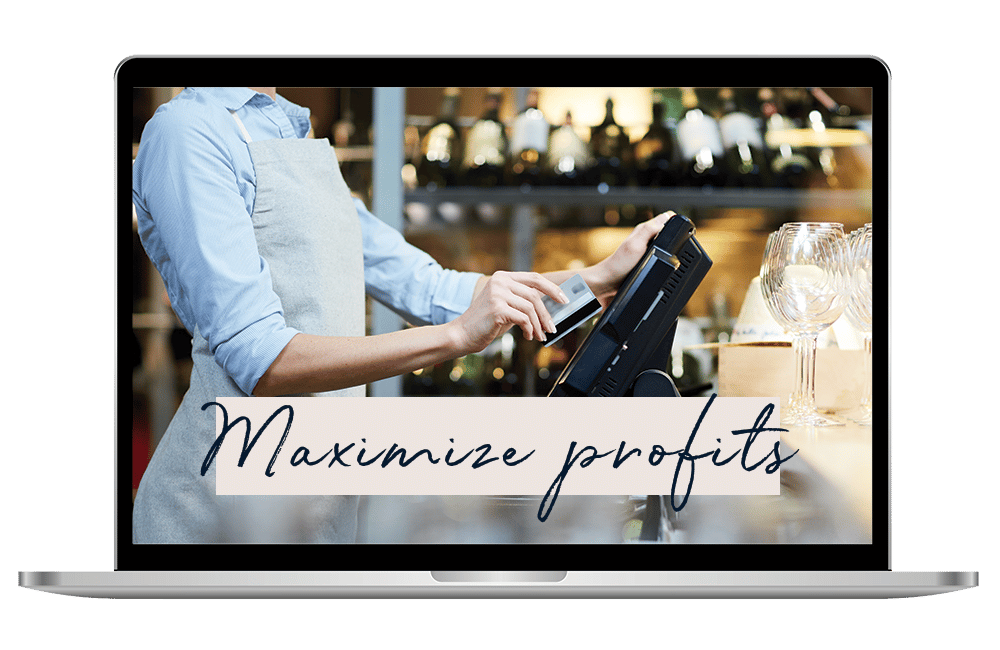
The three costly mistakes you could unknowingly be making?
Find out in this FREE guide and restaurant assessment specifically designed to reveal the unexpected hurdles standing between you and exponential business growth.
Thank You To Our Sponsors
Did You Know That 7 out of 10 Adults Dine Out To Celebrate Birthdays?
You Can Easily Capture This Lucrative Business!
For a limited time only, popmenu is offering our listeners $100 off your first month plus an unchanging lifetime rate.
Request a DEMO:
Want to become a podcast sponsor?
Please get in touch with Roger at roger@restaurantrockstars.com
